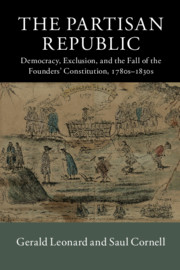How Did the Constitution Become the Basis for Exclusionary Politics?
In a new book, Professor Gerald Leonard, a leading historian of US constitutionalism, explores the “whitening” of democracy in the early 19th century.

There is a statue of Martin Van Buren on the home desk of Boston University School of Law Professor Gerald F. Leonard. The statue, a gift from Leonard’s wife, is small, but Van Buren looms large in much of Leonard’s scholarship.
The eighth president of the United States was a prominent figure in Leonard’s first book, The Invention of Party Politics: Federalism, Popular Sovereignty, and Constitutional Development in Jacksonian Illinois, which tells the story of how the Republican and Democratic parties emerged in the early 19th century amidst almost universal anti-political party sentiment. And Van Buren also plays a starring role in Leonard’s most recent book, The Partisan Republic: Democracy, Exclusion, and the Fall of the Founders’ Constitution, 1780s–1830s, coauthored with Fordham University Professor Saul Cornell. The book was published in January.
If The Invention of Party Politics—the result of Leonard’s PhD dissertation in history—focused on how political parties developed in the framework of an elitist, anti-party Constitution (answer: in part through Van Buren), The Partisan Republic tries to answer a broader question: How did an elitist, anti-party Constitution come to be interpreted as a “small-d” democratic Constitution that legitimated the political exclusion of women and people of color (answer: also in part through Van Buren)?
“How did this exclusion actually become part of the white, male ideology of what they called democracy?” Leonard asks. “There’s a weird paradox in there—it’s not just that they forgot these people; the exclusion itself was part of the notion of what democracy was to these white men.”
Leonard, a Law Alumni Scholar, is a leading historian of American constitutionalism. Although he says scholars of the Constitution have traditionally traced the evolution of its interpretation through the courts—and particularly the US Supreme Court—Leonard’s books contribute to an emerging body of scholarship that views constitutional development as a product of a variety of social, political, cultural, and institutional factors.

“We’re trying to say the Constitution, in its development, belongs to everyone at once,” Leonard explains. “Not in some glorified way, but as a matter of political and social fact. It’s a political document.”
In analyzing constitutional development, scholars like Leonard consider not just the role of the courts, but also the influence of the legislative and executive branches, political parties, individual states, and popular protest movements.
“We’re not really prioritizing” one over the other, he says. “The meaning of the Constitution depends on all of this, on a plurality of ideas.”
In The Partisan Republic, Leonard does not argue that the United States would have been ready to recognize the rights of women and people of color if political parties had not emerged when they did. But he thinks there might have been some limited room for that kind of thought, earlier, if they hadn’t.
“The federalists and Hamiltonians… came from a tradition that rejected democracy in any form and instead insisted on certain natural or socially stable hierarchies,” he says. “I imagine there could have been some openings, if federalists had remained on top, for the advancement of women and black Americans, but it’s hard to imagine a real revolution.”
But, instead, party politics seemed to hasten the official disenfranchisement of the majority of the population. In research for the new book, Leonard says he was particularly intrigued by information about the New York Constitutional Convention of 1821 at which “universal suffrage” was adopted for most white men. The primary documents from the convention revealed the “depth of feeling” in the debates at the time, Leonard says.
“They could be yelling about democracy out of one side of their mouths and then explaining that the exclusions are not only consistent with democracy but entirely essential out of the other side,” he says.
Van Buren was one of those guiding the convention, warning that the “character of the increased number of votes would be such as would render their elections rather a curse than a blessing,” Leonard writes in his book.
“I am completely fascinated by Martin Van Buren,” says Leonard. “He was present at the critical moment of the transition from republican notions of American governance to democratic notions of governance. But he also helped infuse ‘democracy’ with racism.”
As a historian, Leonard says he is reluctant to identify “lessons” from the past for the present and future. But he does say his book—and other scholarship that deals with the evolution of constitutional thought—can be a reminder that people shouldn’t focus too much on the US Supreme Court as the final arbiter of constitutional questions. As an example, he points out that, even with Roe v. Wade, the availability of abortion in states across the country varies widely, as it will if Roe v. Wade is ever overturned.
“The difference the Supreme Court makes on hot-button issues is much less than people often suppose,” he says. “It’s generally going to be a much more complicated story about politics and culture and a range of institutions.”
Reported by Rebecca Beyer
Related News
- David H. Webber Produces the Research Handbook on Representative Shareholder Litigation
- Professor Gary Lawson Awarded Inaugural Cooley Book Prize
- Professor Kathryn Zeiler’s New Book Provides Overview on Behavioral Law and Economics
- Motherhood, Poverty, and the Right to Privacy